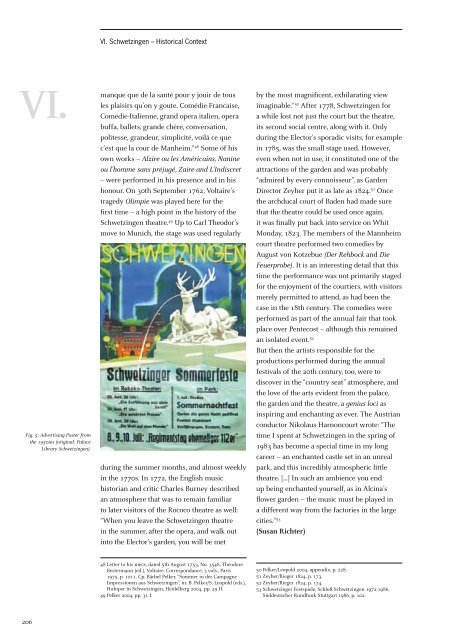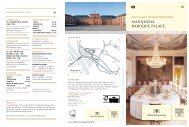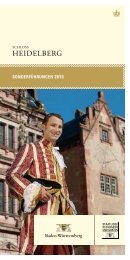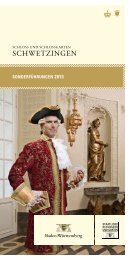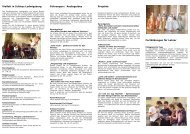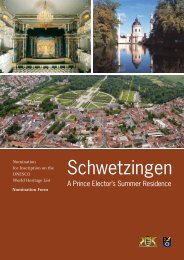Schwetzingen - Schlösser-Magazin
Schwetzingen - Schlösser-Magazin
Schwetzingen - Schlösser-Magazin
You also want an ePaper? Increase the reach of your titles
YUMPU automatically turns print PDFs into web optimized ePapers that Google loves.
VI.<br />
Fig. 5: Advertising Poster from<br />
the 1950ies (original: Palace<br />
Library <strong>Schwetzingen</strong>).<br />
206<br />
VI. <strong>Schwetzingen</strong> – Historical Context<br />
manque que de la santé pour y jouir de tous<br />
les plaisirs qu’on y goute. Comédie-Francaise,<br />
Comédie-Italienne, grand opera italien, opera<br />
buffa, ballets, grande chère, conversation,<br />
politesse, grandeur, simplicité, voilà ce que<br />
c’est que la cour de Manheim.“ 48 Some of his<br />
own works – Alzire ou les Américains, Nanine<br />
ou l’homme sans préjugé, Zaire and L’Indiscret<br />
– were performed in his presence and in his<br />
honour. On 30th September 1762, Voltaire’s<br />
tragedy Olimpie was played here for the<br />
first time – a high point in the history of the<br />
<strong>Schwetzingen</strong> theatre. 49 Up to Carl Theodor’s<br />
move to Munich, the stage was used regularly<br />
during the summer months, and almost weekly<br />
in the 1770s. In 1772, the English music<br />
historian and critic Charles Burney described<br />
an atmosphere that was to remain familiar<br />
to later visitors of the Rococo theatre as well:<br />
“When you leave the <strong>Schwetzingen</strong> theatre<br />
in the summer, after the opera, and walk out<br />
into the Elector’s garden, you will be met<br />
48 Letter to his niece, dated 5th August 1753, No. 3548, Theodore<br />
Bestermann (ed.), Voltaire. Correspondance, 3 vols., Paris<br />
1975, p. 1011. Cp. Bärbel Pelker, “Sommer in der Campagne -<br />
Impressionen aus <strong>Schwetzingen</strong>”, in: B. Pelker/S. Leopold (eds.),<br />
Hofoper in <strong>Schwetzingen</strong>, Heidelberg 2004, pp. 29 ff.<br />
49 Pelker 2004, pp. 31 f.<br />
by the most magnificent, exhilarating view<br />
imaginable.“ 50 After 1778, <strong>Schwetzingen</strong> for<br />
a while lost not just the court but the theatre,<br />
its second social centre, along with it. Only<br />
during the Elector’s sporadic visits, for example<br />
in 1785, was the small stage used. However,<br />
even when not in use, it constituted one of the<br />
attractions of the garden and was probably<br />
“admired by every connoisseur”, as Garden<br />
Director Zeyher put it as late as 1824. 51 Once<br />
the archducal court of Baden had made sure<br />
that the theatre could be used once again,<br />
it was finally put back into service on Whit<br />
Monday, 1823. The members of the Mannheim<br />
court theatre performed two comedies by<br />
August von Kotzebue (Der Rehbock and Die<br />
Feuerprobe). It is an interesting detail that this<br />
time the performance was not primarily staged<br />
for the enjoyment of the courtiers, with visitors<br />
merely permitted to attend, as had been the<br />
case in the 18th century. The comedies were<br />
performed as part of the annual fair that took<br />
place over Pentecost – although this remained<br />
an isolated event. 52<br />
But then the artists responsible for the<br />
productions performed during the annual<br />
festivals of the 20th century, too, were to<br />
discover in the “country seat” atmosphere, and<br />
the love of the arts evident from the palace,<br />
the garden and the theatre, a genius loci as<br />
inspiring and enchanting as ever. The Austrian<br />
conductor Nikolaus Harnoncourt wrote: “The<br />
time I spent at <strong>Schwetzingen</strong> in the spring of<br />
1983 has become a special time in my long<br />
career – an enchanted castle set in an unreal<br />
park, and this incredibly atmospheric little<br />
theatre. […] In such an ambience you end<br />
up being enchanted yourself, as in Alcina’s<br />
flower garden – the music must be played in<br />
a different way from the factories in the large<br />
cities.“ 53<br />
(Susan Richter)<br />
50 Pelker/Leopold 2004, appendix, p. 228.<br />
51 Zeyher/Rieger 1824, p. 173.<br />
52 Zeyher/Rieger 1824, p. 174.<br />
53 Schwetzinger Festspiele, Schloß <strong>Schwetzingen</strong> 1972-1986,<br />
Süddeutscher Rundfunk Stuttgart 1986, p. 102.


